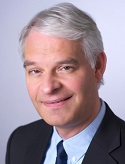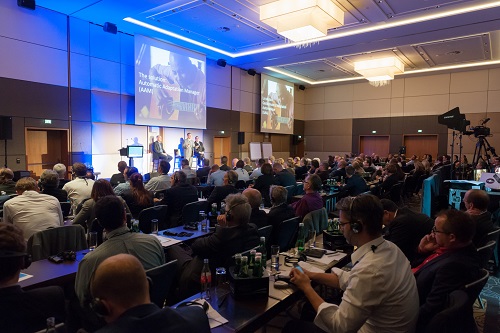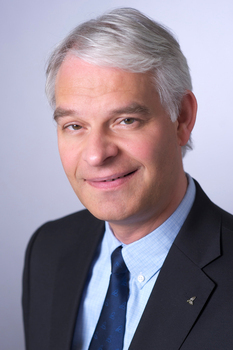Patient and Practice Growth Take Center Stage at Unitron
Carolyn Smaka: Jan, Unitron recently hosted a European conference in Vienna to help your customers succeed in their businesses by focusing on the in-clinic experience. Can you tell me more about this event?

Jan Metzdorff: This event was developed to generate a meaningful dialogue between ourselves and our customers in the context of today’s changing marketplace. We had more than 120 professionals from all over Europe, and presentations and breakout sessions were held simultaneously in four languages. Topics included new customer relationship trends, patient-centered care, best practice exchanges, and about factors that contribute to patients dropping out of the hearing healthcare journey before getting treatment.
In essence, we designed the event to communicate the benefits of putting patient care and practice growth center stage. The conference dialogue ranged from the role of the manufacturer to business opportunities arising from enhancing patient experience. Unitron has changed its strategic focus these past few years to turn to customer-focused initiatives. The philosophy is quite simple. We have very good technology; that is one of the benefits of being part of the Sonova group. We have a full product line with great technology including unique innovations like Flex. On the product side, we are in a very strong position.
Moving forward, we are focused not only on our products, but also on what we call in-clinic success. This is much more than products. Data from around the world tell us that of 100 people who have hearing loss, only a relatively small percentage actually obtain hearing solutions. Some people are told by their physician that hearing loss is a part of aging and they should live with it. Of those who actually make it to a hearing care practice, many still walk out without obtaining hearing aids. We are committed to finding innovative ways to work with our customers to drive greater adoption through the in-clinic patient experience and, ultimately, practice success. We believe there are substantial growth opportunities for us by focusing on the human side of the equation.

Unitron recently hosted a European conference in Vienna focusing on the in-clinic experience.
Carolyn: Dialogue at the conference centered on the barriers that stand in the way of consumers obtaining hearing solutions, and what can be done about them. What are some of those barriers?
Jan: The first barrier is stigma. We want to make sure that when consumers are first introduced to hearing aids, they have a positive experience before they even try them on. We created a design philosophy that requires our hearing aids to look attractive in the hand. People should be positively surprised when they see a hearing aid for the first time.
The next barrier is comfort – both in the way the hearing aid feels on the ear, and in the way it sounds. If a hearing aid does not feel and sound great initially, you cannot counsel the patient that it is optimized for speech in noise and they will get used to it. This creates a negative first impression, and leads to what we have identified as the third barrier, negative perceptions about hearing aid performance.
The performance of the hearing aid in listening situations is very important. This is related to the hearing aid’s particular features to address speech in noise, or its unique programs for enjoying music, and so on. If you have an appealing design and provide initial fit and sound comfort, but patients do not notice benefit in important situations, they will reject them.
Carolyn: How does the Flex concept support in-clinic success?
Jan: The Flex concept came out of our research into the hearing journey, and the obstacles along the way to that final decision to purchase hearing instruments. The program was developed to overcome patient insecurities when seeking the help they need. Today, consumers expect to try products before they buy them, especially when they are making a significant investment. For example, you do a test drive before you buy a car. With Flex, we give the practitioners and the patient an opportunity to use a Flex:trial device for a few weeks. This way, they have an opportunity to experience it their everyday life and know what they are getting from the hearing solutions and it alleviates any anxiety about the purchase decision.
Carolyn: What type of business support does Unitron provide to its customers?
Jan: We recognize that not just in our industry, but in all industries today, the market place is changing. Traditionally, businesses would advertise their products or services and it was a one-way communication intended to make a case and convince the consumer. Today, people are listening less and less to what a business or manufacturer is saying about their products, and listening more to what their peers or other customers are saying. A good example is Trip Advisor. If you are planning a vacation and need to book a hotel, you can first visit Trip Advisor and see what other people are saying about those hotels. Somehow we put more trust in the opinions of other guests – whom we have never met - than in what the hotel is saying about itself. This paradigm has even moved to healthcare and we see many websites that allow you to rate your doctors and other health providers including hearing healthcare professionals.
At Unitron, we look at our own ratings with our customers, using the Net Promoter Score or NPS. Net Promoter Score is used in many industries and businesses around the world. It asks the question, “How likely is it that you would recommend [your company] to a friend or colleague on a scale from 0 - 10?” The concept of NPS is that if you rate a business as a 0 to 6, you are a detractor or did not have a good experience and could likely damage your reputation by negative word-of mouth. If you rate a 7 or 8, you are neutral and might say the business was okay, but it did not make a big impression on you and you are open to competitive offerings. If you rate 9 or 10, you would likely be a promoter of the business to others. Businesses average their promoters minus their detractors to get an overall NPS score, which helps them to get an understanding for how they are doing with their customers. Most importantly, it is an indicator of how many people are promoting your business via word of mouth. Word of mouth is not new, but just think how of how you consider purchases today, it is becoming more and more important to businesses today.
At our meeting in Vienna, we presented ways in which our customers can use Net Promoter Score in their own practices. We also provided benchmarking data and other tools to help them leverage word-of-mouth at the clinic level, and to track and measure their success.
Carolyn: I know Brian Taylor has been talking a lot about these issues in your online courses as well.
Jan: Yes. In Vienna, Brian explored some of the psychological factors related to the hearing care process such as determining how ready people are for a hearing solution. There is a clear correlation between how ready people are when they walk in to your office to how likely they are to purchase hearing aids. This enables you to adjust your counseling and presentation accordingly. If a person is reluctant and is only at the appointment to appease their spouse, the conversation will be very different as compared to the conversation with someone who recognizes their hearing loss and is highly motivated to seek a solution. Instead of focusing on the audiogram, which may be identical in both cases, the professional can tailor the counseling to the person’s motivation or readiness. If someone is highly motivated, you would probably go into the solution discussion fairly quickly. If someone is not really motivated, you would paint a higher level picture and provide a different perspective.
Carolyn: Will Unitron be holding more customer events similar to the one in Vienna?
Jan: Yes, most definitely. The marketplace is changing, customers’ needs are changing, and the competitive landscape is changing. This is not just about delivering products. At these meetings we will bring new thoughts and ideas forward, and explore these areas with our customers. We are not the specialists in everything, but we have been able to collect some valuable market insight from both our industry and other industries and share it in a way that provides practical benefit. The feedback from our Vienna event was great and we will continue to have these types of events in North America to help our customers succeed in their businesses.
Carolyn: It’s been a pleasure speaking with you, Jan. Thanks for your time.
For more information, please visit Unitron on the web at unitron.com or the Unitron Expo Page on AudiologyOnline.


